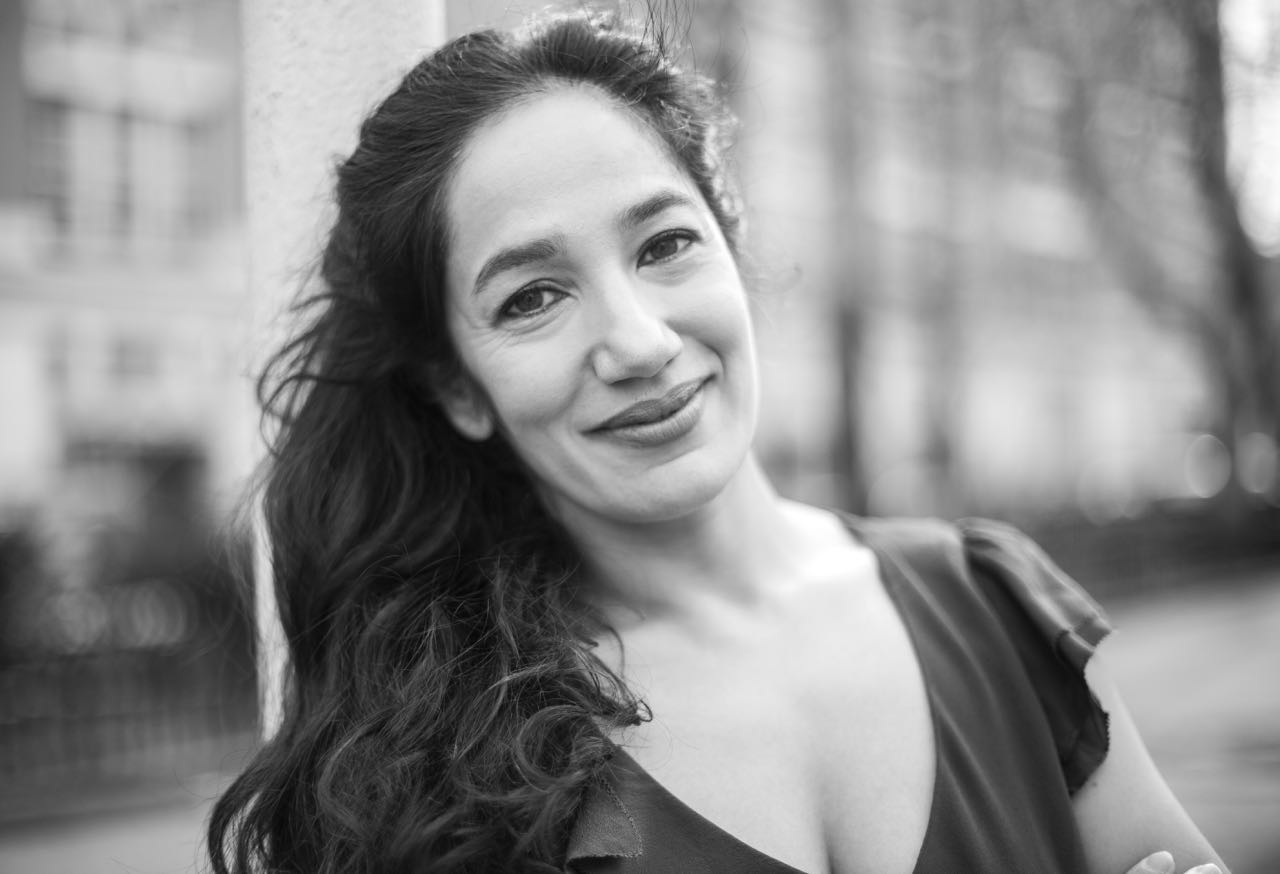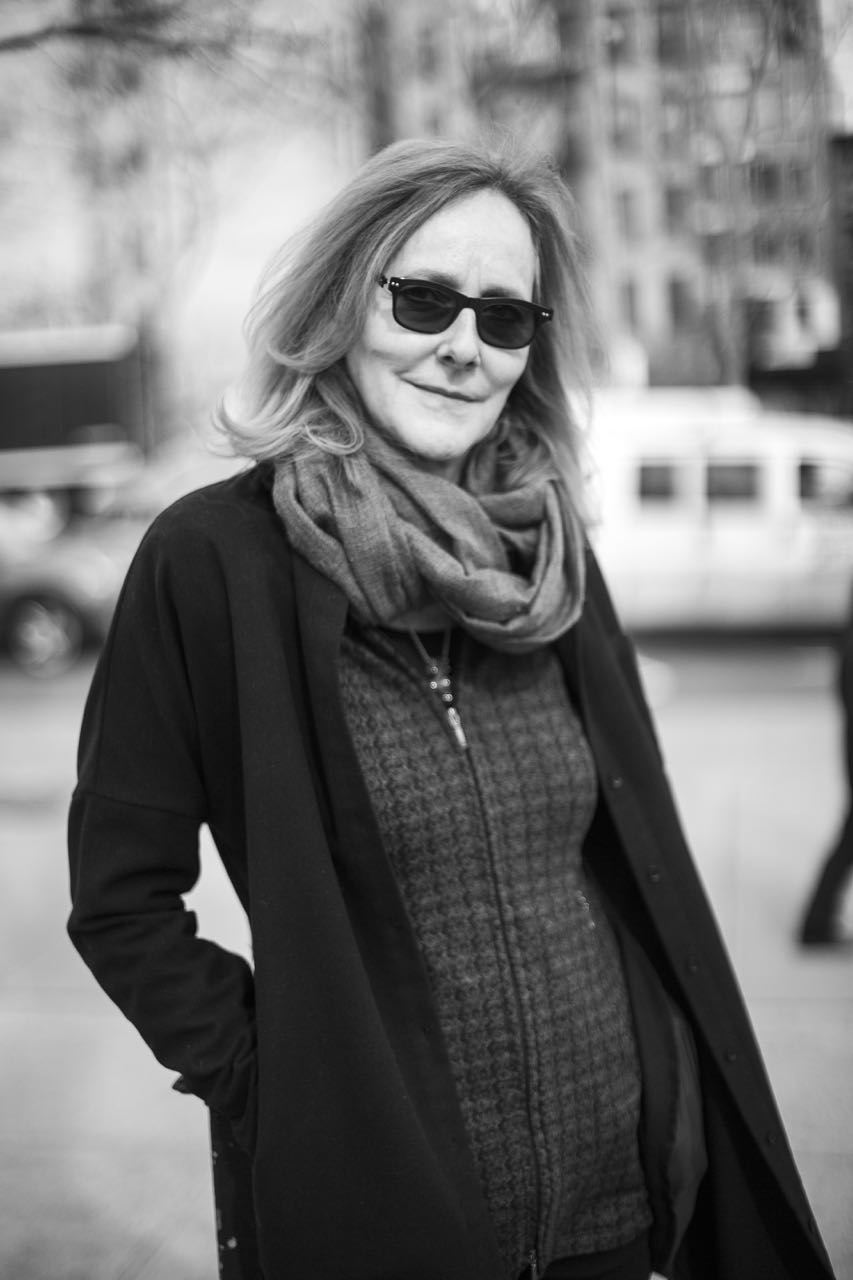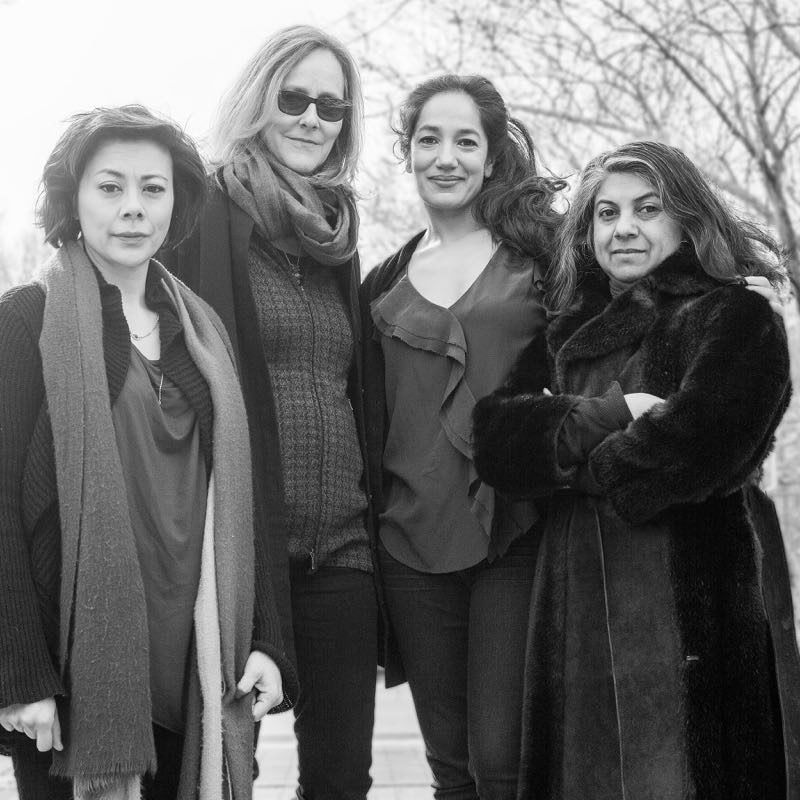Jo Bonney, Purva Bedi, Angel Desai, and Rita Wolf on “An Ordinary Muslim”

Written by Victoria Myers
Photography by Marisa Chafetz
February 22nd, 2018
In Hammaad Chaudry’s new play, An Ordinary Muslim, the characters navigate their family, faith, and the complicated nature of assimilation. Among the characters are three women—played by Purva Bedi, Angel Desai, and Rita Wolf—who are each trying to balance their own wants with the demands of other people in their lives, societal expectations, and perceptions. The play, which is set in the U.K. in 2011, marks Hammaad Chaudry’s professional New York debut, and is directed by Jo Bonney, who has a long history of staging premieres by some of contemporary theatre’s most well-known playwrights. We recently sat down with Jo along with Purva, Angel, and Rita to discuss their process for rehearsing and performing An Ordinary Muslim.
For each of you, what was your initial interest in the play?
Jo: Whenever you read a really good play, you start thinking, “Okay, these characters are fully dimensional. The circumstances are very specific.” In this case, it’s a British Pakistani Muslim family, but because it’s a family with these different generations, it means that it’s universal. I could imagine the amazing cast we could get, which we did.
When you step into someone else’s life that you don’t have access to, it just sort of cracks open the way you think about things. And then, you take that out into the world. This is such a strange tipping point in terms of, not just how Muslims are talked about today, but South Asian, and particularly Pakistani people [are talked about in] the media—it just seems to be out of control, sometimes. But something this political, I just saw it as a really affecting family drama.
Purva: As a South Asian woman, I was very interested in the play on a personal level. I don’t feel there are enough stories out in the world about the unique experience of being South Asian and living in a non-South Asian country where you’re the minority. And in a lot of the stories, there are a lot of cliches and one-dimensional characters, even in South Asian stories, where the dad is always this sort of buffoon, and the mom is always cooking her food or bringing chai. I’ve been in many of those films and plays. And what I loved about Hammaad’s play was the complexity of it, and that it borrowed from those tropes and then exploded them. It also is totally no-holds-barred. The play is not afraid to talk about anything, and then explode it into all of these different issues and sides. I found it to be a really complex depiction of a South Asian family.
Angel: Sanjit De Silva, the lead in the play, is a very close friend of mine, and he’s been talking to me about it and raving about it. I was, of these ladies, the last to come on board. I saw the first act of the script in July, and it was clear that it was extremely well-written. Like Purva said, it’s so refreshing to have a complex depiction of a South Asian family, and to have it be as dramatic and wrought and complex and funny and layered as any other family drama that we might have encountered. Any script that’s really well-written and that’s got really great characters, you’re drawn to. And then, knowing some of the great people that were already attached to the project was just like, “Well, that’s kind of a no-brainer.”
Rita: I, like Sanjit who Angel just mentioned, have been with the play in reading form for a very long time—for close to three years at this point. And I’m also from the U.K. originally. The play is set in London. Once in a while, you get a play which is so very specific, about a time and a place, and a kind of shift in the conversation about society and how society’s changing, and it highlights so many other areas of, “What was I doing?” This play is set in 2011. What was I doing in 2011? What was going on? What was happening politically in the world? And it’s a play with a huge number of ideas in it, and it attempts to harness all of that through the prism of one particular family at a very complicated time in our collective history in the West.
Angel: I’ll second what Rita said. That’s another draw of the play, that it’s all of the different and timely political issues that it’s trying to tackle. It’s so great to be a part of something that sparks so much conversation and that’s important to what’s happening in the world in terms of Muslim and/or South Asian relations with the West.
Jo: We’re in a time where there’s a huge movement of peoples around the world. One of the ideas that Hammaad is working with is simply the idea of, where do you belong? What is it to call someplace home, what is it to be someone who no longer lives in your family’s country of origin? You end up in another country, or you’re the first generation in that country, and you also are having children, and somehow you’re never quite seen as truly being a citizen of that country. That’s a kind of terrible, complex idea of what identity is. Where do you belong? Where do you call home? When are you accepted? And that seems to be a bigger, and ongoing issue as we move along. We have this massive movement throughout different countries, and a growing intolerance of that, too. And that’s very much one of the big things he’s talking about. And it is at the center of the dilemma for the lead character.

During the rehearsal process for this, how did you balance the big ideas of the play with the moment to moment action?
Rita: I think you focus on the moment to moment action. And this is a first play. Hammaad Chaudry has never had a play produced before. This is a brand new play, and so you trust the play and Jo and Hammaad. In the rehearsal room, Jo will bring the specifics to bear out the larger picture.
Angel: You end up talking about the moment to moment, and that bring you to the conversation about whatever the topics are. We tend to talk about them. During the table work phase and the workshop phase, you’re sitting around discussing the ideas in it. But, like with any other play, you talk about the moments, and you are finding out what the intentions are. It just so happens that in this play, there are so many things to talk about that come up.
Rita: I’m constantly taken aback, in the doing of it, at what the bigger picture issues of this play are. And that will become more evident the more people of different types come and see it, and what they get from it. And then you say, “Oh, yeah. Well, of course it’s about that, too.”
Jo: Once you put it up in front of an audience, that audience can be a mix of anyone. You’ve got people who are specifically from this culture, or understand this family dynamic, or their personal experience is that of the characters on the stage. But then you have audience members who are completely outside that experience. So suddenly, you’ve got an interesting dialogue happening in the audience, because you can’t control what personal baggage they bring to the storytelling. We just have to hope that we tell the story clearly enough and specifically enough that they can hook onto it without bringing all of their personal information to it.
Purva: It is a new play, but Hammaad has been working on it since graduate school. And I actually saw a very old draft as part of his thesis. And the play was very different. It has evolved so much. And in that, I feel that he’s really honed what it is our play is about and what our story is. And so, coming back to the question, I feel the micro and the macro of the personal and the big picture is something he’s been fine-tuning for a while. As an actor stepping into it, I make a personal choice, and I go with it. And then we talk about how it’s serving the story. And sometimes it’s not actually telling the big story, and then we tweak and fine-tune to make sure that personal choice is works with the big picture.
Jo: It’s also that he’s given three really strong female characters these voices. And each one of them is really different. You’ve got Malika, who Rita is playing, who’s originally from Pakistan. You’ve got the first-generation daughter born in London, which is Angel’s Javaria. And then you’ve got Saima, who is married to the son. And they all are coming from different backgrounds and different families, and what it is to be a modern woman in Britain, and what it is to be a woman who’s carrying all the tradition of what it is to be a wife and mother from Pakistan.
Purva: And the Muslim faith and what it means to each of us.
Rita: And that in itself, for a new male playwright, is very unusual, especially for a play dealing with a particular cultural group. It’s great that he’s written three interesting and complex women into the bigger story, and they’ve all been given very clear voices.

What has the process been in terms of thinking about gender on stage? There have been actresses in the past who have said that they really had to fight the pressure of feeling like they have to be likable onstage. Or just this idea that people make a lot of assumptions about women based on their physical appearance.
Angel: Here’s the thing about having Jo as the leader: she doesn’t operate from that place. She will not bring anything into the room that doesn’t belong there. Yes, females encounter that in this business, oh my God, all the time. But Jo will always go from the script, it all begins with the script. If you have a script that begins with some complex women and talking about these people with integrity—they are who they are—and we’re all in the process of trying to discover who they are together. So in this process, there hasn’t been any talk about something along those lines. It’s just, who is the person? What’s specific to that person? How does it fit in the story? And it’s pretty great. I feel like that’s sort of the best kind of feminist statement: Let’s just do this. If you have a complex enough female character, let’s just do it and help make them as round as possible. And then it speaks for itself.
Rita: In the breakdown of all the characters at the beginning of the play, there are no physical descriptions of any of the women, which is interesting.
Jo: We spent a lot of time talking about intentions. The choices come from a place, not of being liked, but of, “Why am I doing this? What do I want from him or her?”
Rita: And then it’s up to the audience whether they like you or dislike you. And I think there’s a huge spectrum for each of these women between the liking and maybe not liking that happens.
Purva: And actually, in terms of being likable or sexy, all three of us are extremely covered, or wearing hijabs, and quite defy what is considered hot and sexy in this society, in this play.
Jo: Although, they actually are. That’s the interesting thing: the outer dress has nothing to do with how appealing or sexy a woman is anyway. So I think that’s a wonderful thing, and hopefully it is apparent that these women who are choosing, because of their religion, to wear hijabs or to cover up more, does not in any way reduce their sense of agency or their sense of being attractive in the world. The outer stuff is important to them in terms of religion, but it’s also superficial in terms of their sense of themselves. I think that’s something that’s interesting for Westerners to wrap their minds around. In many cases, I think, we’re so judgmental of choices that women make in other cultures and other religions. And that’s one of the big things that I’m hoping will be a discussion coming out of this piece of storytelling. Most women I know, and very liberal women, often have a problem with other women wearing hijabs or covering up, and you kind of have to go, “Why is that, and where are your prejudices in that?” I’m hoping that will be part of the discussion.

Did you all do research for the play? And how did you incorporate that into the creative part of the process?
Jo: It was actually a lot of research. First, you have the playwright, who is bringing in a lot of his personal information and sharing it. And there was a lot of dramaturgy on the play, even in terms of things that are mentioned, because you’re talking about a family that originally came from India, and then during partition, the family moved to Pakistan, and what did that mean for them. How many people here know about partition and what a huge event it was? How many people here understand the different areas of Islam? We had to steep ourselves in all of that. We had a woman come in who was incredibly helpful in terms of answering a lot of questions for us.
Angel: And none of us are Muslim. None of us in the cast are actually practicing Muslims. The South Asian element is stuff that we’re all very familiar with. But just to understand the different aspects of faith that are practiced, it comes in, and you find yourself going, “Oh, I wonder what that is.”
Purva: A lot of the research is also what I’ve spent my life learning about, studying, and living in. I certainly have always known Muslim people. And growing up in a country where that’s not the majority, and at an early age having my white best friend tell me it’s pronounced ‘Moslem,’ not ‘Muslim,’ and being like, “Oh, I didn’t know that.” And as an immigrant child, grappling with how the outside sees my culture and a culture similar to mine.
Angel: There are the aspects that are so familiar to us from the play and we know whether we’re Muslim or not. As a brown person, whatever the faith is, that feeling of being in a minority, and then experiencing that outside majority glaring at that or examining that, is something that we all just know, because that’s our life experience. So there’s this combination of very specific research about the specifics of this play, and then the larger themes that it captures so universally, so well, we get that.
Purva: That experience of othering and of being othered by the world around you, which is what this play is about. For myself, I came to this country as a five-year-old and was an immigrant—I’m an immigrant still—and grappling with fitting in, but also wanting to honor who I am and where I come from.
Rita: The world is really changing fast, and Islam is the fastest growing religion in the world. We’re at a very interesting point in our history, in terms of our understanding and acceptance of different religions. And this play is definitely about that too, which is a huge subject.

What do you hope audiences will take away from the show?
Rita: I’m already starting to get a sense that people feel very much as though it’s a play for them, which is what I would hope: for them and about them.
Angel: I hope that they’ll see themselves in it, no matter where they are, who they are, where they come from. And also that it’ll make them think about the different things that the play brings up, and start a conversation. I would love it if this play could start a lot of conversations that could progress.
Purva: Empathy. I think that’s one of the reasons I do theatre. And, particularly in this case, because we talk so much about the hijab. I think there is a lot of judgment and violence around that, all over the world. And so, empathy towards that.
Jo: I would hope that, as in any good piece of storytelling, there’s a breaking down of people’s preconceptions. And that it will have them leaving with a new sense of possibilities, a sense of how to look at things they already thought they knew, but now they realize they actually weren’t necessarily on solid ground on that. And then that would then impact every single thing that they read or see after that. I mean, that’s a big wish, but that’s what you hope for.

